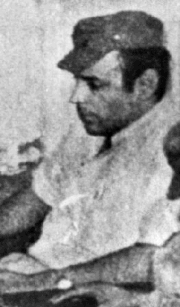
Back Abu Nidal Afrikaans صبري البنا Arabic আবু নিদাল Bengali/Bangla Abu Nidal Catalan Abú Nidal Czech Abu Nidal Danish Abu Nidal German Αμπού Νιντάλ Greek Abu Nidal Spanish Abu Nidal Basque
Abu Nidal | |
|---|---|
| أبو نضال | |
 Abu Nidal in an image released in 1976 | |
| Born | Sabri Khalil al-Banna May 1937 |
| Died | 16 August 2002 (aged 65) |
| Resting place | Al-Karakh Islamic cemetery, Baghdad |
| Nationality | Palestinian |
| Organization | Fatah: The Revolutionary Council (known as the Abu Nidal Organization) |
| Movement | Palestinian Rejectionist Front |
Sabri Khalil al-Banna (Arabic: صبري خليل البنا; May 1937 – 16 August 2002), known by his nom de guerre Abu Nidal, was the founder of Fatah: The Revolutionary Council (Arabic: فتح المجلس الثوري), a militant Palestinian splinter group more commonly known as the Abu Nidal Organization (ANO).[1] At the height of its militancy in the 1970s and 1980s, the ANO was widely regarded as the most ruthless of the Palestinian groups.[2][3][4][5]
Abu Nidal ("father of struggle")[6] formed the ANO in October 1974 after a split from Yasser Arafat's Fatah faction within the Palestine Liberation Organization (PLO).[7] Acting as a freelance contractor, Abu Nidal is believed to have ordered attacks in 20 countries, killing over 300 and injuring over 650.[4][8][9] The group's operations included the Rome and Vienna airport attacks on 27 December 1985, when gunmen opened fire on passengers in simultaneous shootings at El Al ticket counters, killing 20. Patrick Seale, Abu Nidal's biographer, wrote of the shootings that their "random cruelty marked them as typical Abu Nidal operations".[10][11]
Abu Nidal died after a shooting in his Baghdad apartment in August 2002. Palestinian sources believed he was killed on the orders of Saddam Hussein, while Iraqi officials insisted he had committed suicide during an interrogation.[12][13] "He was the patriot turned psychopath", David Hirst wrote in The Guardian on the news of his death. "He served only himself, only the warped personal drives that pushed him into hideous crime. He was the ultimate mercenary."[14]
- ^ Melman, Yossi (1987) [1986]. The Master Terrorist: The True Story Behind Abu Nidal. Sidgwick & Jackson, 213.
- ^ Chamberlin, Paul Thomas (2012). The Global Offensive: The United States, the Palestine Liberation Organization, and the Making of the Post-Cold War Order. New York: Oxford University Press, 173.
- ^ Kifner, John (14 September 1986). "On the bloody trail of Sabri al-Banna", The New York Times.
- ^ a b Randal, Jonathan C. (10 June 1990). "Abu Nidal Battles Dissidents", The Washington Post.
- ^ Partrick, Neil (2015) [1997]. "Abu Nidal", in Martha Crenshaw and John Pimlott (eds.), International Encyclopedia of Terrorism. London: Routledge, 326–327.
- ^ AbuKhalil, As'ad; Fischbach, Michael R. (2005) [2000]. "Biography of Abu Nidal – Sabri al-Bana", in Philip Mattar (ed.). Encyclopedia of the Palestinians (11–13), 11. Melman 1987, 53, translates it as "father of the struggle".
- ^ Seale, Patrick (1992). Abu Nidal: A Gun for Hire. London: Hutchinson, 99.
- ^ Hudson, Rex A. (September 1999). "The Sociology and Psychology of Terrorism: Who Becomes a Terrorist and Why?", Federal Research Division, Library of Congress, 97.
- ^ "Abu Nidal Organization (ANO)", United States Department of State, June 2004.
- ^ Seale 1992, 243.
- ^ Suro, Roberto (13 February 1988). "Palestinian Gets 30 Years for Rome Airport Attack", The New York Times.
- ^ Whitaker, Brian (22 August 2002). "Mystery of Abu Nidal's death deepens", The Guardian.
- ^ Fisk, Robert (25 October 2008). "Abu Nidal, notorious Palestinian mercenary, 'was a US spy'", The Independent.
- ^ Hirst, David (20 August 2002). "Abu Nidal", The Guardian.
© MMXXIII Rich X Search. We shall prevail. All rights reserved. Rich X Search